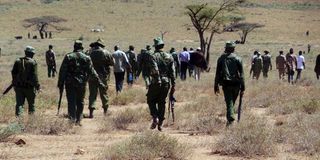Samburu West locals in fear as low-flying chopper spotted in 'bandit hideouts'

Security forces on patrol in Samburu following attacks in 2016.
An unmarked helicopter has on numerous occasions been seen flying unusually low and making frequent landings in parts believed to be bandit hideouts in Samburu West.
Locals told the Nation.Africa on Wednesday that they believe the mysterious helicopter may be having a secret mission in the region.
Others claimed that there was a probability that the aircraft was being used to supply ammunition to bandits who have been wreaking havoc in the region, for the last seven months.
According to locals, the said helicopter has been landing in parts of Suguta Valley, Malaso Valley, and other caves in Pura, all the areas that were mapped as dangerous and disturbed.
"The mysterious helicopter has been landing even at very odd hours in the evening. It is landing in the caves and we suspect that it is being used to supply ammunition to bandits who are still living there," said a local elder who declined to be named.
In March this year, the government banned low-altitude aircraft from flying over the disturbed areas in parts of Samburu West and other parts of the North Rift region as it intensified a multi-agency operation to crash banditry.
Interior Cabinet Secretary Kithure Kindiki said the ban, which took effect on March 13, would remain in place until further notice.
In the directive by CS Kindiki, only aircraft engaged in security operations are allowed to operate in the area.
Prof Kindiki's declaration of a no-fly zone order came after multiple reports linked some powerful figures to using choppers to ferry weapons and ammunition to criminal gangs.
But, when contacted by Nation.Africa on the matter, Samburu County Commissioner Henry Wafula said he was only aware of a mysterious helicopter that used to fly low over disturbed places about two months ago. Without revealing further details, he said that helicopter issue was “dealt with”.
“It used to fly low around the caves and it was dealt with,” Mr Wafula told the Nation.Africa.
He added that relative calm has returned in some areas that were affected by banditry, and he praised the government's move to recruit the National Police Reservists (NPR) to help restore order in the area.
More than 600 new police reservists have been recruited since December last year and they joined other security forces to combat rampant insecurity in Samburu West.
The Kenya Kwanza administration seems to be banking on home-grown solutions in the fight against endemic cattle rustling by investing in community-based intelligence, modern personal protection equipment, and kitting security personnel.
According to Mr Wafula, the police reservists have worked closely with local police officers to tame cases of banditry in Pura, Longewan, Lkeek Sabuki, and the entire volatile border of Samburu and Baringo counties.
Mr Wafula said that with the NPRs, being natives, have been able to quickly respond to reports of cattle rustling and banditry.
The administrator noted that the reservists were familiar with the rugged terrain compared to other units, and with that knowledge they have helped restore sanity in the hard-hit areas.





